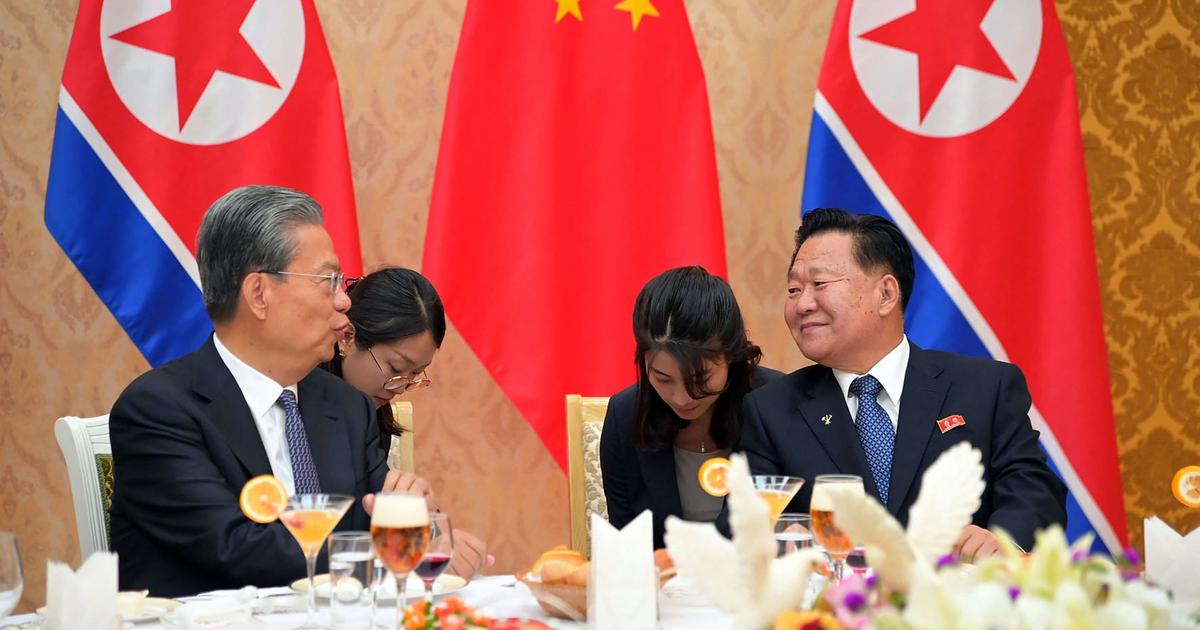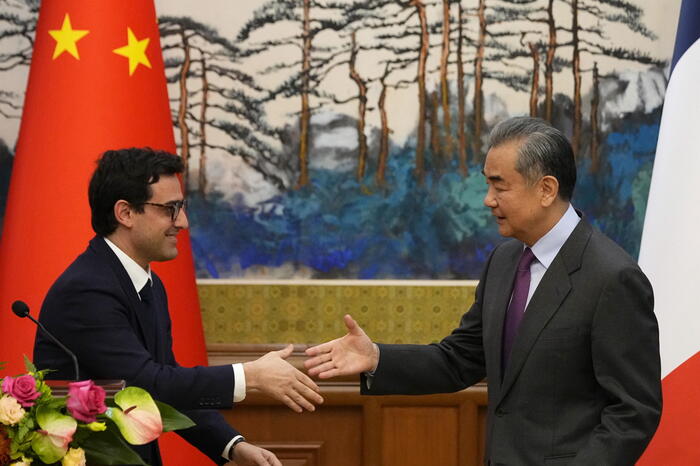German China policy: is the “turning point” in relations with Beijing now?
Created: 04/30/2022, 06:28
By: Sven Hauberg
As Hamburg's first mayor, Olaf Scholz met China's head of state Xi Jinping in 2017.
Not since his election as chancellor.
© Xie Huanchi/Xinhua/Imago
Sanctions against China?
No more taboo.
And in other respects, too, the Federal Republic is taking a new course in relation to Beijing.
This was recently shown by a trip to Asia by Olaf Scholz.
Munich/Berlin - It's debatable whether it's the right time to travel to East Asia when war is raging back in Europe.
The Union in particular found it inappropriate that Olaf Scholz flew away now of all times instead of showing leadership at home.
What is undisputed, however, is that the Federal Chancellor did not make his inaugural visit to Asia in China, but in Japan.
Because the meeting with Japan's Prime Minister Fumio Kishida was not only a friendly sign to Tokyo, it was also, and above all, a nod to Beijing.
"It is no coincidence that my first trip to this part of the world as Federal Chancellor is taking me here today, to Tokyo," said Scholz.
His predecessors in the Chancellery, Gerhard Schröder and Angela Merkel, had always visited China first and only then, if at all, traveled on to Tokyo.
Merkel met with the Beijing leadership almost every year. She last flew to China in September 2019, just a few months before the outbreak of the global corona pandemic.
Scholz' government machine, on the other hand, only flew
over
China on the way to Asia .
And that should not only have to do with the corona situation in Beijing, Shanghai and elsewhere in the country.
In Tokyo, Scholz called his visit on Thursday (April 28) "a clear political signal that Germany and the European Union want to continue and intensify their commitment in the Indo-Pacific region".
Scholz also praised the fact that the "value partner" Japan had "clearly and resolutely supported Ukraine, Europe and the USA" in the Ukraine war.
Along with South Korea and Singapore, Japan is one of only three countries in the region to support sanctions against Russia.
"Even though Ukraine is of course much further away from Tokyo than from Berlin," added Scholz.
Chancellor Scholz during the Ukraine war in Japan: "Align China policy with the China that we actually find"
The Chancellor did not mention China, but when Scholz in Japan asked himself "what dependencies we can and want to afford in the future, for example in strategically important technologies or raw materials", it was not only directed against Russia.
More specifically than Scholz became Japan's prime minister.
"Strong concerns" were exchanged with regard to Beijing, said Kishida, citing the human rights situation in China and especially in Xinjiang and the situation in the South China Sea, where China is making disputed territorial claims.
Chancellor Olaf Scholz met Japan's Prime Minister Fumio Kishida in Tokyo on Thursday.
© Imago/Zuma Wire
For a long time, Olaf Scholz was considered the spiritual successor to Merkel's China policy, which focused on trade relations with the country and addressed human rights issues in a rather quiet voice.
In his government statement in mid-December, however, he made a course correction.
“The Chinese leadership represents its interests with great self-confidence.
Germany and Europe have every reason to represent our interests just as confidently and with commitment," said Scholz, and demanded that Germany "align its China policy with the China that we find in real life."
This was a rejection of the change-through-trade dreams of previous governments, which had believed for decades that Beijing would sooner or later open up to Western values if Germany sold enough cars in China.
At the latest since China's head of state and party leader Xi Jinping took action against dissenters with an iron fist, one should have known better.
Russia's invasion of Ukraine brought final clarity as to which side Beijing is on.
Beijing still refuses to speak of a war and blames the US and NATO for the escalation, not Moscow.
For China, Russia is not an aggressor, but a friend.
China's role in the Ukraine war: announcement of punitive measures if it supports Russia
A motion by the traffic light parties, which was passed by a large majority in the Bundestag on Thursday, shows that Berlin has long since had no illusions about China's role in the war.
The People's Republic of China must "give up its endorsement of the war" and instead actively promote a ceasefire, the motion says.
In the event that Beijing should actively support the Kremlin, punitive measures are threatened.
"Any effort to circumvent the sanctions imposed on Russia by the western community of states or even to supply weapons to Russia" will "entail economic and personal sanctions".
Such clear words in the direction of China are rare in the Bundestag.
However, they fit the new German tone towards Beijing.
Annalena Baerbock's Foreign Ministry is still working on a China strategy;
However, it was already apparent in the election campaign in which direction things should go, when the Green politician called for a mix of “dialogue and toughness” as well as a value-oriented foreign policy.
In mid-March, Baerbock then said in a speech at the start of the development of a new national security strategy that Germany had to “intensively face its economic dependencies” with a view to China.
Most recently, Baerbock then assured Lithuania support in the conflict with Beijing.
During a visit to Vilnius, the Foreign Minister described the fact that China had imposed sanctions on the EU country as "unacceptable" and called for the sanctions to be lifted.
China-critical tones are also increasingly coming from the FDP.
In an interview with Die
Zeit
, Federal Minister of Finance Christian Lindner recently demanded that "we should preferably do business with those who are not only trading partners, but also want to be value partners".
This was primarily related to Moscow, but also to Beijing.
Because Lindner said he was worried "that we import a lot of energy from Russia and have strong economic ties with China".
In order to "diversify international relations in our exports as well", the federal government must lay the foundations by opening doors and facilitating the legal framework, Lindner continued.
China and Germany: Traffic light course – Union also criticizes Beijing
Support for the China traffic light course also comes from the Union.
Union faction leader Johann Wadephul criticized Thursday in the Bundestag that Scholz was in Japan instead of in parliament, where the delivery of heavy weapons to Ukraine was voted on.
However, the CDU and CSU supported the government motion by the SPD, Greens and FDP, which threatened China with sanctions if it supported Russia.
Angela Merkel in Beijing in 2010: The then Chancellor met with Xi Jinping when he was still Vice President of China.
© Xinhua/Imago
And at the beginning of April, CDU leader Friedrich Merz called for a tougher approach to Beijing.
"We also have to rethink German and European China policy," he said in a Deutschlandfunk interview.
Germany must “quickly and significantly reduce” its dependency on China.
In the interview, Merz also picked up on China's threatening gestures towards Taiwan - even if he didn't go as far as the British Foreign Secretary recently, who called for the democratically governed island to be protected by NATO.
Merz still found clear words.
“China is threatening Taiwan militarily.
And we should already write the price tag that the People's Republic of China and the Chinese authorities need to take note," he said.
Which is of course easier to demand in the opposition than when you are sitting on the government bench.
With its new course, Germany is completely in line with the EU, with which Baerbock has declared that it wants to coordinate its China policy.
At the virtual summit meeting with Xi Jinping and China's Prime Minister Li Keqiang, Commission President Ursula von der Leyen and Council President Charles Michel launched an all-out attack.
China's attitude in the Ukraine war was criticized, the human rights situation in Tibet, Xinjiang and Hong Kong was addressed and Beijing's actions against Lithuania were condemned, it was said afterwards.
China and Germany: massive economic dependencies - EU becomes an uncomfortable partner
The fact that Brussels is increasingly becoming an uncomfortable partner for Beijing is also reflected in a number of controversial EU legislative proposals.
A current draft law aims to prevent state-owned companies that have been given a lot of money by the government from winning tenders in the EU or buying up technology companies.
State-owned companies from China in particular have secured unfair competitive advantages in this way, Brussels believes.
Another regulation provides that countries can be penalized that discriminate against European companies in public tenders.
In concrete terms, this means that if a state refuses to open up its public procurement market to EU suppliers to the same extent as the EU, sanctions are threatened.
What is meant here is Beijing in particular.
The planned EU law against forced labor is also addressed not least to China.
Only one thing stands in the way of all the commitments to a new course against Beijing and economic independence from China: reality.
Because the European dependencies on China are enormous, especially in Germany.
China was Germany's most important trading partner last year - for the sixth time in a row.
Goods worth more than 103 billion euros were exported.
Conversely, the investment boom by Chinese companies in Germany and the rest of Europe seems to be over, as a study has shown.
In any case, one thing is clear: a 180-degree turn in German China policy could only be achieved in cooperation with European and transatlantic partners – and it would probably be very expensive.
(sh)








/cloudfront-eu-central-1.images.arcpublishing.com/prisa/GJCBMBH57MQHVYCI4ZPKB6IKRI.jpg)


/cloudfront-eu-central-1.images.arcpublishing.com/prisa/KMEYMJKESBAZBE4MRBAM4TGHIQ.jpg)



